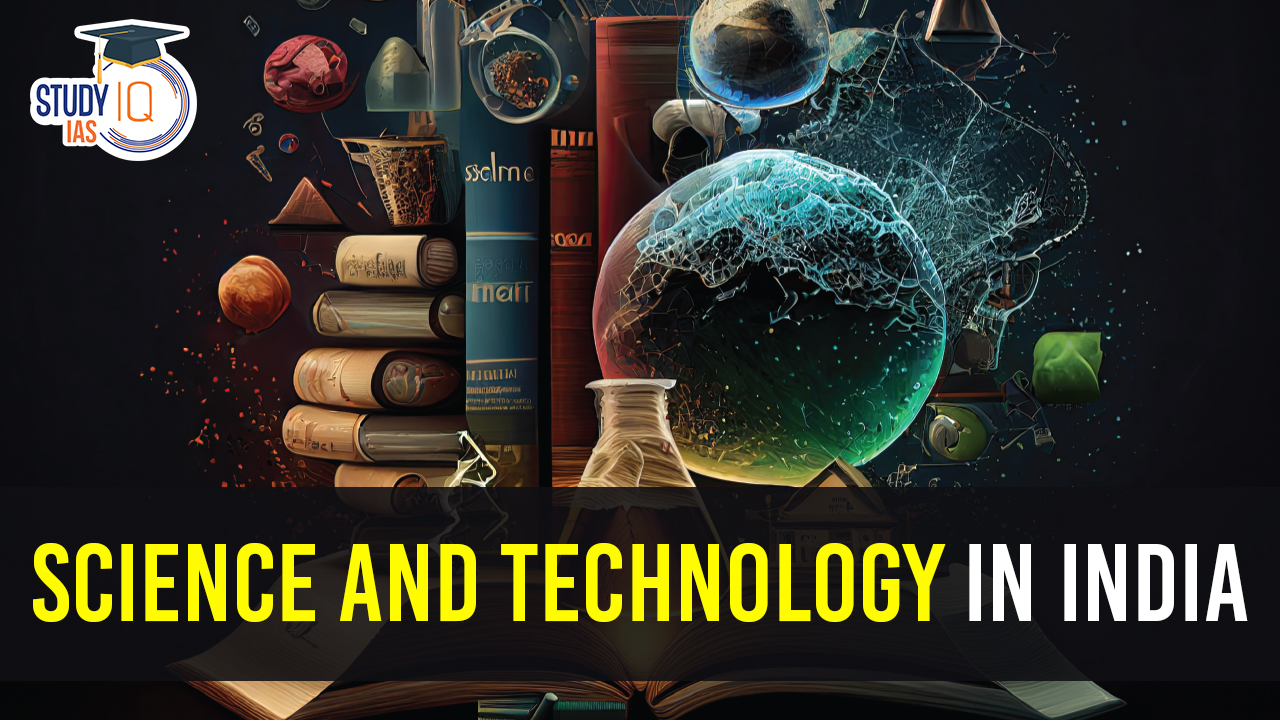Table of Contents
Science and technology have played a pivotal role in shaping India’s modern identity and driving its socio-economic development. With a rich history dating back centuries, India has made significant strides in recent years, positioning itself as a global player in the field of science and technology.
Science and Technology in India
Science and technology have significantly influenced India’s development. With a rich historical legacy, India has made remarkable strides in recent times. The Indian Space Research Organization (ISRO) has gained global acclaim with missions to the moon and Mars, while the IT and pharmaceutical sectors are thriving. These advancements have driven economic growth, improved healthcare, and strengthened the agricultural sector. However, India must address funding, education, and digital access disparities to maintain this momentum and ensure technology benefits all.
History of science and technology in India
India’s history of science and technology is a tapestry of remarkable accomplishments spanning millennia. Ancient Indian mathematicians blazed a trail with the invention of the decimal system and the concept of zero, while astronomers made precise celestial observations. The “Sushruta Samhita” demonstrated advanced surgical knowledge, and India’s metallurgical expertise was renowned. The medieval period witnessed architectural marvels like the Taj Mahal. British colonialism influenced the growth of modern scientific institutions.
Post-independence, India prioritized education and research, giving rise to institutions like the Indian Institutes of Technology (IITs). Contemporary India excels in space exploration, IT, pharmaceuticals, and renewable energy, solidifying its global stature in science and technology. Science and technology have always been integral to Indian culture, with a rich tradition of natural philosophy. The Indian Renaissance, coinciding with the independence struggle, saw significant progress by Indian scientists. Post-independence, the government established robust S&T infrastructure, with the Department of Science and Technology playing a pivotal role.
Role of Science & Technology in India
The role of science and technology in India is pivotal, with significant contributions to the nation’s development and progress. This role can be understood through various dimensions:
Economic Growth
Science and technology play a critical role in driving economic growth. They underpin various industries, including information technology, pharmaceuticals, biotechnology, and manufacturing. India’s burgeoning software and IT services sector, in particular, has led to substantial foreign exchange earnings and job creation. The advancements in these industries have significantly contributed to the country’s Gross Domestic Product (GDP) and overall economic development.
Agricultural Transformation
Science and technology have been instrumental in transforming India’s agriculture sector. The Green Revolution, initiated in the mid-20th century, introduced high-yield crop varieties, modern irrigation techniques, and improved agricultural practices. These innovations increased agricultural productivity, ensuring food security for the growing population.
Healthcare Advancements
Technological advancements in the field of medicine have improved healthcare outcomes in India. Advanced medical equipment, telemedicine, and innovative treatment methods have enhanced the quality of healthcare services. India has also become a prominent player in pharmaceuticals, producing a wide range of affordable generic drugs and vaccines.
Education and Research
Science and technology have fostered a culture of innovation and research in India. The establishment of institutions like the Indian Institutes of Technology (IITs), Indian Institutes of Science Education and Research (IISERs), and world-class research facilities has nurtured a new generation of scientists and engineers. These institutions have not only contributed to cutting-edge research but have also attracted international collaborations.
Space Exploration
The Indian Space Research Organization (ISRO) has achieved significant milestones in space exploration. India’s Mars Orbiter Mission (Mangalyaan) in 2013 marked its entry into interplanetary space exploration. ISRO’s missions have contributed to advancements in communication, remote sensing, and global positioning systems, benefiting a wide range of sectors, including agriculture, disaster management, and urban planning.
Global Contributions
India has become a global contributor in science and technology. Its space missions and pharmaceutical industry have not only served domestic needs but have also had a global impact. India’s information technology sector provides crucial services to businesses and organizations around the world. The nation’s scientists and engineers are increasingly engaged in collaborative research projects with international partners, contributing to global scientific advancements.
Innovation and Entrepreneurship
Science and technology have fostered innovation and entrepreneurship. Start-ups in the technology, biotechnology, and clean energy sectors have gained prominence, attracting investments and generating job opportunities. India’s government and private sector actively support the growth of a vibrant start-up ecosystem.
Recent Developments of science and technology in India
India has a rich history of remarkable achievements in the field of science and technology, spanning from ancient innovations to modern breakthroughs. Here are some notable contributions:
Revolutionizing Agriculture
India’s Green Revolution, a monumental achievement, transformed the country’s agricultural landscape. Agro-scientists introduced high-yielding seeds, modern farming techniques, and improved irrigation practices. As a result, India became self-sufficient in food production, reducing reliance on foreign grain imports and ensuring food security.
Pioneering Satellite Communication
Under the visionary leadership of Vikram Sarabhai, India ventured into space technology. The successful launch of the Space Instructional Television Experiment (SITE) and the INSAT system in 1983 established India as a significant player in satellite communication. This achievement has had a profound impact on telecommunications, broadcasting, and weather forecasting.
Global Pharmaceutical Hub
India has earned its reputation as “the pharmacy of the world.” Government initiatives, including the establishment of Hindustan Antibiotics Limited and Indian Drugs and Pharmaceuticals Limited, along with private sector contributions, have led to the production of affordable and effective drugs and vaccines with a global impact.
Indigenous Defence Advancements
The Defence Research and Development Organization (DRDO) has been pivotal in developing indigenous defence systems, including advanced aircraft, weaponry, tanks, electronic warfare technologies, and missile systems. India’s successful nuclear tests in 1974 and 1998 have reinforced national security and sovereignty.
Space Exploration Excellence
The establishment of the Indian Space Research Organization (ISRO) in 1969 marked a significant milestone. ISRO’s missions, including Chandrayaan (2008) and Mangalyaan (2014), have propelled India to the forefront of space exploration. India became the first nation to reach the orbit of Mars on its maiden attempt, expanding our knowledge of celestial bodies.
Global IT Dominance
The establishment of the Department of Electronics in 1970, coupled with the emergence of public sector companies like ECIL and CMC, challenged the dominance of global IT giants. Today, India stands as the world’s largest exporter of IT services, with companies like Tata Consultancy Services (TCS) ranking among the top 10 IT firms globally, contributing significantly to the nation’s economic growth and technological prowess.
Achievements of India in Science and Technology
Space Exploration
In the realm of space exploration, India has achieved notable milestones through the Indian Space Research Organization (ISRO). ISRO has successfully launched numerous satellites for communication, Earth observation, and navigation. The Mars Orbiter Mission (Mangalyaan), launched in 2013, marked a historic achievement, making India the fourth country in the world to reach Mars on its maiden attempt. Additionally, the Chandrayaan-2 mission was launched to explore the Moon, comprising an orbiter, lander, and rover.
Nuclear Technology
India has made significant strides in nuclear technology, developing capabilities for both civilian and military purposes. The Pokhran-II nuclear tests in 1998 demonstrated India’s nuclear capabilities to the world. The Indira Gandhi Centre for Atomic Research (IGCAR) and the Bhabha Atomic Research Centre (BARC) have played pivotal roles in advancing nuclear science within the country.
Information Technology
India has established itself as a global IT hub, with companies like Tata Consultancy Services (TCS), Infosys, and Wipro leading the industry. These companies have contributed to Silicon Valley and the global tech industry, while Indian engineers and entrepreneurs have made substantial contributions in the field of information technology.
Pharmaceutical and Healthcare
India is a major player in the pharmaceutical industry, producing a significant portion of the world’s generic drugs. Indian pharmaceutical companies have played a crucial role in the global fight against diseases like HIV/AIDS, tuberculosis, and malaria. This contribution to healthcare has had a global impact.
Renewable Energy
India has made significant progress in the field of renewable energy, setting ambitious goals for solar and wind energy generation. The International Solar Alliance (ISA), initiated by India, promotes cooperation among countries in harnessing solar energy, contributing to sustainable development.
Biotechnology
In the field of biotechnology, India has made advancements through research institutions and companies. These advancements encompass genetic engineering, vaccine development, and crop improvement, making significant contributions to the global biotech sector.
Supercomputing
India’s indigenous supercomputer, Param, has been a valuable tool for scientific research and weather forecasting. It showcases India’s capabilities in high-performance computing.
Agriculture and Green Revolution
The Green Revolution in the 1960s and 1970s, led by scientists like Norman Borlaug, transformed agricultural practices in India. It significantly increased food production and played a crucial role in improving food security.
Space Research and Navigation
India’s space research extends to navigation with the launch of its regional satellite navigation system called NavIC. NavIC provides accurate positioning information services to users in India and neighboring regions, enhancing navigation capabilities.
Science and Innovation
Indian scientists and researchers have made substantial contributions to various scientific fields, including physics, chemistry, biology, and mathematics. Their work has elevated India’s standing in the global scientific community and contributed to scientific knowledge worldwide.
Concerns in Science and Technology in India
India’s science and technology landscape faces several concerns that impact its growth and competitiveness:
- Funding Challenges: The level of investment in research and development in India is often insufficient to support cutting-edge scientific endeavors and technological innovations. Inadequate funding hampers the country’s ability to tackle critical challenges and compete globally.
- Educational Variability: Disparities in the quality of science and technology education across the country hinder the development of a skilled workforce. Education reform is needed to make curriculum more relevant and equip students with practical skills.
- Brain Drain: The emigration of highly skilled researchers and scientists to foreign countries in pursuit of better opportunities results in a substantial loss of expertise and innovation within India.
- Innovation Ecosystem: Establishing a thriving innovation ecosystem with support for startups and entrepreneurship remains a challenge. Translating research into commercially viable products or services can be difficult.
- Infrastructure Gaps: Inadequate infrastructure, including state-of-the-art research facilities, hinders scientific progress and innovation.
Way Forward
To bolster India’s science and technology sector, key measures are vital. Firstly, an increase in research and development funding is imperative, with a greater budget allocation to support innovative projects and cutting-edge scientific endeavors. Concurrently, a focus on education reform is essential, enhancing the quality of science and technology education with modernized curricula and practical skill development.
Mitigating the brain drain necessitates incentives to retain talented researchers and scientists while nurturing an innovation ecosystem through support for startups and streamlined regulations promotes the commercialization of research. Infrastructure development, including state-of-the-art research facilities, will facilitate scientific progress. These measures collectively position India to contribute significantly to global scientific advancements and ensure socio-economic development.
Science and Technology in India UPSC
Science and Technology is a significant subject within the Civil Services Examination. It’s evident from the numerous questions related to this subject that appear in both the UPSC Prelims and Mains. To assist IAS aspirants in their exam preparations, this article offers downloadable PDFs of UPSC notes on Science and Technology. In the UPSC Mains, Science and Technology form part of the GS III syllabus. Additionally, science subjects such as Botany, Chemistry, and Biology are among the optional subject choices for the IAS Mains exam. These scientific subjects offer the potential for high scores, but often, aspirants face challenges in balancing static and dynamic aspects while making notes, especially when dealing with contemporary issues from the news.


 Vitamin D Deficiency: Causes, Symptoms a...
Vitamin D Deficiency: Causes, Symptoms a...
 GAURAV: Long Range Glide Bomb (LRGB)
GAURAV: Long Range Glide Bomb (LRGB)
 Gestational Diabetes Mellitus (GDM), Cau...
Gestational Diabetes Mellitus (GDM), Cau...





















